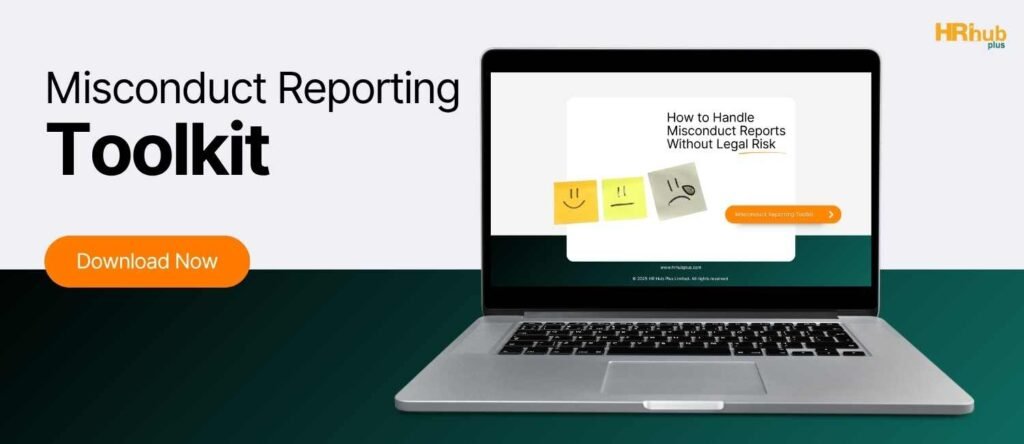In the UK, most organisations continue to lean heavily on formal grievance procedures to address workplace concerns. But in today’s evolving professional landscape, marked by hybrid work, complex social issues, and rising employee expectations, this approach is no longer sufficient.
A grievance procedure is fundamentally reactive. It waits for something to go wrong. What workplaces need now is a proactive, inclusive, and responsive misconduct reporting culture, one that prevents problems from escalating, protects all employees, and reflects the nuanced realities of modern working life.
When Reporting Falls Short
Too often, misconduct isn’t formally reported. Employees might fear backlash, worry about job security, or simply not trust that their concerns will be handled appropriately. In some cases, the lines between misconduct, misunderstanding, and policy grey areas are genuinely hard to navigate. But silence doesn’t equal resolution and when issues go unreported, they grow.
A recent case in Scotland shows just how high the stakes can be. Sandie Peggie, a veteran nurse at NHS Fife, was recently cleared of gross misconduct after she objected to sharing a changing room with a transgender colleague, Dr Beth Upton. Peggie claimed she was subjected to unlawful harassment after raising her concerns, while Upton filed her own complaint citing misgendering and unprofessional conduct.
After 18 months of internal investigation, NHS Fife concluded there was insufficient evidence to support the misconduct claims. But the damage, reputational, relational, and emotional, has already been done. The case, now the subject of an ongoing employment tribunal, has made headlines across the UK and drawn attention to the intense legal, ethical, and cultural challenges surrounding workplace conduct and identity.
It also highlights the limitations of reactive systems. Had there been a safe, proactive way for all parties to express concerns confidentially, early, and with clear procedures for resolution. This situation might never have escalated as it did.
Grievances Are Not Enough

A grievance procedure is necessary, but it’s not a catch-all. Grievances are often formal, legalistic, and intimidating, especially in emotionally charged situations or when personal identity is involved. Employees may avoid them unless the issue is extreme. And by then, it’s often too late to prevent fallout.
A misconduct reporting system, by contrast, encourages early intervention. It’s structured to catch concerns when they’re still manageable, offering employees a way to raise red flags without committing to full-scale legal action. It also protects employers, allowing them to resolve disputes before they snowball into media stories, legal fees, or deep divisions in the workplace.
In cases like Peggie’s, a well-established reporting culture might have provided a neutral pathway for discussion, facilitated dialogue, and ensured dignity for both individuals, without an 18-month internal process or the glare of public scrutiny.
The Price of Inaction
Ignoring the need for proactive reporting isn’t just risky, it’s expensive. NHS Fife has reportedly spent over £220,000 defending its actions in this single tribunal case. Add to that the reputational damage, time lost, and toll on workplace morale, and the cost of doing nothing becomes crystal clear.
This is not an isolated issue. Across the UK, employment tribunals involving allegations of discrimination, harassment, and whistleblowing are rising, particularly where gender identity, belief systems, and privacy collide. These are complex issues, and organisations without clear, inclusive reporting mechanisms are simply unprepared.
Building a Better Reporting Culture
A healthy misconduct reporting culture does not arise by accident. It must be built deliberately with clear policies, accessible channels, supportive leadership, and an organisational commitment to listening without judgment.
In small and medium-sized enterprises (SMEs), this can be particularly powerful. With smaller teams and closer relationships, employees are often more willing to speak up, provided they feel safe in doing so. Transparency, education, and a clearly communicated process make all the difference.
It’s not about creating a culture of complaints. It’s about trust, prevention, and resilience.
Take Action Before the Headlines Hit

At HR Hub Plus, we understand the pressures facing UK employers today. That’s why we’ve created the Misconduct Reporting Toolkit, a free and practical resource designed specifically for SMEs. It includes everything you need to implement a proactive reporting system from policy templates and communication strategies to practical guidance on sensitive issues like gender identity and workplace conflict.
The Sandie Peggie case may be headline news today, but it is just one example of the deeper challenges that arise when organisations lack the tools and culture to address misconduct effectively.
Download the free HR Hub Plus Misconduct Reporting Toolkit by filling in the form and take the first step toward creating a workplace that is safe, inclusive, and prepared.




